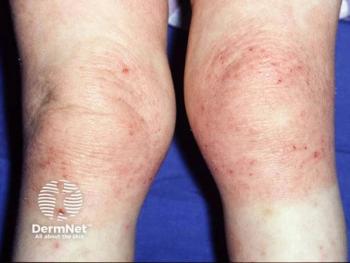
JAK Inhibitor Selection Considerations
Ruth Ann Vleugels, MD, MPH, MBA, shares insights that she gives her own residents on JAK inhibitor selection, risks, benefits, and data available.
Episodes in this series

This news content has been independently developed and is not endorsed by the American Academy of Dermatology.
This Dermatology Times Expert Perspectives series delves into the multifaceted landscape of atopic dermatitis (AD) care and treatment. Through interviews with 4 leading dermatologists, this series explores key benchmarks, emerging trends, personalized medicine approaches, long-term safety considerations, and the integration of novel therapies in the management of AD. Each episode provides valuable insights into navigating the heterogeneity of AD presentations, selecting appropriate treatment plans tailored to individual patient needs, and incorporating the latest guidelines from the American Academy of Dermatology. From discussing the nuances of patient education and shared decision-making to addressing the intersection of comorbidities with AD management, this series equips dermatology clinicians with the knowledge and strategies necessary to optimize patient outcomes and enhance the quality of care.
In this episode, Ruth Ann Vleugels, MD, MPH, MBA, dermatologist at Brigham and Women’s Hospital and Boston Children’s Hospital in Boston, Massachusetts, shares insights that she gives her own residents on JAK inhibitor selection, risks, benefits, and data available.
Dermatology Times Interview with Ruth Ann Vleugels, MD, MPH, MBA
Dermatology Times: What factors do you take into consideration when prescribing JAK inhibitors for AD?
Vleugels: When I use JAK inhibitors for AD, I always want to really think about my patient selection. I think that's the most important point when you're trying to decide whether to use a JAK inhibitor for AD because they're fantastic medications. They work really quickly. They have high efficacy. And so really, what I want to think about is: Who's the correct patient?
So when we're doing that, we actually ask patients if they have any history of cancer, and we ask them if they're up to date on their current cancer screening. We also ask patients about any history of clotting or current tobacco use. We ask patients about cardiac risk factors. Then, our job is going to be to modify those risk factors just like we would with any other our other patients on systemic therapies. And as long as I pick the appropriate patient, I feel very comfortable treating patients long-term with JAK inhibitors.
I'm very fortunate because I've lived in the dermatology/rheumatology world for a large chunk of my life. And it's good to remind ourselves that we've actually been using JAK inhibitors since 2012 for many of our diseases. So when we're talking to our patients, we often want to remind them that although these drugs were more recently approved for their AD, we've actually been using these medications for well over a decade and for many other indications as well. During extended treatment periods with JAK inhibitors, we do want to follow laboratories and our patients.
Typically once a patient has been on a JAK inhibitor for a few months, we're just monitoring their labs quarterly, and so many of those labs we're following as we would in any patient on systemic therapies, include blood counts, liver tests, kidney function tests. Then, we always want to monitor their lipids as well. These are things that I'm going to be addressing on a quarterly basis and ensuring that they're all normal, and if anything changes, address those as I would in any patient on a systemic medication. Most of the time, their labs are actually normal on JAK inhibition, but it is something we check quarterly to ensure that they are in every patient we're treating.
When we're selecting a JAK inhibitor, often we're driven by what's on label for the particular disease, and thankfully, we have more than 1 JAK inhibitor approved for AD. So for many years, we've been using JAK inhibitors off label for AD, particularly in our patients with more than 1 inflammatory or autoimmune disease, and we knew that they were effective, but thankfully now we have FDA approval for our patients and often we're reaching for a JAK, in particular, in patients who have moderate to severe disease and also in those patients where we need improvement because we know these therapies are really phenomenal in reducing our patients' itch. We know often, even when their disease looks a lot better, they can still have residual pruritus, which interferes with their sleep and interferes with their daily activities. So another reason we're often reaching for JAK inhibitors is to help reduce that residual itch, and also rapidity of onset.
DT: What are the major advantages of JAK inhibitors for AD?
Vleugels: So thankfully, JAK inhibitors have very rapid onset of action. One of the things I like to highlight when I'm teaching my residents is the fact that, rather than reaching for prednisone, which is often what dermatologists have done in the past, because it can act as an off switch for AD and works very rapidly, we can actually reach for an agent like a JAK inhibitor and completely bypass prednisone which has such such substantial risks for our patients. When we're using JAK inhibitors for AD, one of the advantages is that we have once-a-day dosing, so that's a huge advantage for our patients to improve adherence. The other thing that really helps is that, because of their rapid onset of action, patients can tell within a couple of days often that they're having benefit from their therapy. So it's really interesting because even within 1 to 2 days of medication, they often will notice that they're actually starting to improve and that also is really helpful in getting patients to adhere to their medicine. So long-term adherence with JAK inhibitors is something that is made more simple by the fact that we have once-a-day dosing and they have rapid onset of action. But of course, whenever we see our patients, we're always talking about how often they're able to take their medicine. We know that to some degree for all of our patients on on any medication. Adherence can be a challenge, but these particular characteristics of JAK inhibitors clearly make adherence more palatable in our AD patients than many of the other therapies we have.
Transcript has been edited for clarity
Newsletter
Like what you’re reading? Subscribe to Dermatology Times for weekly updates on therapies, innovations, and real-world practice tips.
















